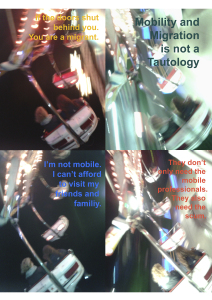Mobility and Migration is not a Tautology
by Käthe Knittler, Fanny Müller-Uri, Silvia Schröcker, Precarity Office Vienna
(University of Vienna)

A Militant Research Contribution to Migration in Europe in the Context of Crisis
Our project evolves out of the current conjugations of precarity, migration and crisis. After the outbreak of the economic and financial crisis in 2008 (labour) migration to Austria from countries of southern Europe started to increase and picked up especially since 2011. The trend of people leaving countries hardest hit by the crisis was accelerating with an increase of 45% from 2009 to 2011. The highest increase of labour migration was measured by the OECD in Ireland, followed by Germany, and Austria on the third place: From 2010 to 2011, immigration to Austria rose by 27%.
In the light of these developments, this project examines recent intra-European (labour) migration, taking Austria, with Vienna as its central metropolitan area, as an exemplary instance. It sets out to develop not solely an academic process but wants to depart from shared needs and desires of precarious workers and/as new European migrants. Therefore we decided to work together with the initiative Precarity Office Vienna which since September 2013 opened a space for giving mutual advice about labour- and migration related issues and for discussing and developing self-organisation practices.
The focus of this ETM project is on new European migrants dealing with (a) changes of Austrian/EU migration policies and legal frameworks promoting labour mobility within Europe. To approach these questions it is crucial to gain (b) perspectives of activists around migration and mobility as a common understanding of these terms is not taken for granted but seen as products of hegemonic struggles. Finally the process and results of this project should be part of (c) a small knowledge archive within the Precarity Office Vienna which can be used for further projects/events/debates/articles/campaigns. Apart from changes in the legal conditions, it is meant to document the experienced margins and maneuvering spaces of working and living in Austria as a migrant, as well as the many and varied practices of self-organization.
The methodological strategy involves the compilation and analyses of militant research, content and discourse analysis.
